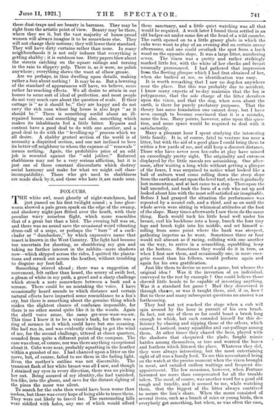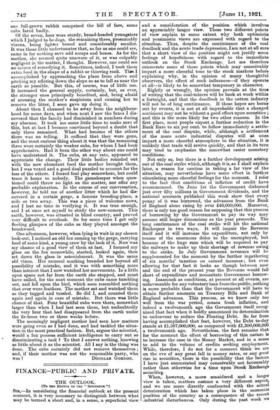FOX-CUBS. T HE white owl, most ghostly of night-watchmen, had just
passed on his first twilight round ; a lone glow- worm showed a pale green spark on the edge of the swamp, and shadowy night-jars flitted over the heath, with their peculiar wavy noiseless flight, which more resembles that of a great bat than a bird. The evening lull was on, and there was no sound save the occasional weird vibrating drum-call of a snipe, or perhaps the " burr " of a cock- chafer or dumbadore," by which expressive name that insect is known in the West Country. The light had become too uncertain for shooting, so shouldering my gun and taking no further interest in the rabbits—mere shadows now—which skipped across the rides, I quitted the planta- tions and struck out across the heather, without troubling to disguise my foot-fall. Something stirred ahead ; there was a suggestion of movement, felt rather than heard, the scurry of swift feet, a gleam of white in my path, a growl and a sharp challenge which struck a note somewhere between a bark and a scream. There could be no mistaking the voice. I have occasionally heard sounds to which distance and certain natural effects have imparted some resemblance to a fox's cry, but there is something about the genuine thing which makes the slightest chance of confusion impossible, for there is no other sound quite like it in the woods. Again the shrill voice arose, the same grr-wow-wow-wo-ow. This time I knew it to be a vixen's bark, for there was a ring of menace in it which could have but one meaning. She had run in, and was evidently circling to get the wind of me, for the second challenge, uttered at closer quarters, sounded from quite a different point of the compass. The case was clear, of course, nor was there anything exceptional about it. Cubs were near, probably squatting in the heather within a gunshot of me. I had chanced upon a litter on the move, but, of course, failed to see them in the fading light. Even the mother's outline was not discernible. The transient flash of her white breast was all I saw, and though I strained my eyes in every direction, there was no picking her out. Being assured of my identity, she had vanished, fox-like, into the gloom, and save for the distant sighing of the pines the moor was silent. To search for the cubs then would have been worse than useless, but there was every hope of being able to trace them. They were not likely to travel far. The surrounding hills were riddled with holes, any one of which would afford them sanctuary, and a little quiet watching was all that would be required. A week later I found them settled in an old badger-set wider some firs at the head of a wild coombe.
The earth opened on to a little grassy glade in which the cubs were wont to play of an evening ;Aid on certain sunny afternoons, and one could overlook the spot from a larch wood on the opposite slope. It was a large litter, numbering seven. The vixen was a pretty and rather strikingly marked little fox, with the white of her cheeks and breast unusually pronounced. I had gathered that impression from the fleeting glimpse which I had first obtained of her, when she barked at me, so identification was easy. It is worth remarking that I saw no dog-fox anywhere near the place. But this was probably due to accident I know many experts of to-day maintain that the fox is polygamous, that the sole charge of the litter devolves upon the vixen, and that the dog, when seen about the earth, is there for purely predatory purposes. That the theory has some foundation one cannot deny, but I have seen enough to become convinced that it is a mistake, none the less. Many points, however, arise upon this ques- tion, and some space would be required to deal with it satisfactorily.
Many a pleasant hour I spent studying the interesting little family. It is, of course, fatal to venture too near a litter, but with the aid of a good glass I could bring them to within a few yards of me, and still keep a discreet distance. Those who have never seen fox-cubs at play have missed an exceedingly pretty sight. The originality and cuteness displayed by the little rascals are astonishing. One after- noon, after waiting a long while without getting a glimpse of the foxes, I was surprised to notice what looked like a ball of auburn wool come rolling down the steep slope from the earth and out upon the level turf, where it gradually lost momentum, and at last came to a stop. Thereupon the ball uncurled, and took the form of a cub who sat up and looked about him with the most self-satisfied air imaginable.
Before I had grasped the situation the performance was repeated by a second cub, and a third, and so on until the whole seven were sitting in whimsical attitudes at the foot of the slope. Many times afterwards I saw them do the same thing. Each would tuck his little head well under his breast, curl his backbone into a hoop, bunch the four tiny legs and brush tight into his middle, and set himself a- rolling from some point where the bank was steepest, gathering impetus as he went. Sometimes three or four would roll abreast as if racing, colliding with one another on the way, to arrive in a scrambling, squabbling heap at the bottom. Sometimes they would do it in turn, as when I first saw them, and occasionally one, in more ener- getic mood than his fellows, would perform again and again for his own gratification. Just like them to devise so novel a game, but whence the original idea ? Was it the invention of an individual, conveyed to the rest by example ? One could believe those shrewd little heads to be capable of inventing anything. Was it a standard fox game ? Had they discovered it throigh chaatee, or was it taught them, and, if so, how ? But to these and many subsequent questions no answer was forthcoming. They had not yet reached the stage when a cub will spin around by the hour in pursuit of his own brush. In fact, not one of them so far could boast a brush long enough to whisk, but each consoled himself for this de- ficiency by chasing and nipping those of the others, which caused, I noticed, many squabbles and ear-pullings among them. At other times they chased the bees, played with the shadows that chequered the glade, fought mimic battles among themselves, or tore and worried the bones and feathers which littered the place. Whatever they did, they were always interesting, but the most entertaining sight of all was a family feed. To see this necessitated being on the watch at the precise moment when the vixen brought in meat, and entailed endless waitings and frequent dis- appointment. The few occasions, however, when Fortune favoured me more than compensated for all the trouble taken. The meal, of course, was another word for a good old rough and tumble, and it seemed to me, while watching them, that the biggest of the litter always contrived to secure the lion's share. When the menu consisted of several items, such as a bunch of mice or young birds, then everybody got something, but when, as was often the case, one full-grown rabbit comprised the bill of fare, some cubs fared badly. • Of the seven, four were sturdy, broad-headed youngsters which I judged to be dogs, the remaining three, presumably vixens, being lighter boned and considerably smaller. It was these little unfortunates that, as far as one could see, came in for nothing save 'odd scraps and bones. As for the mother, she seemed quite unaware of it, or was culpably negligent in the matter, I thought. However, one could see no means of remedying it. Sometimes, indeed, I took them extra food in the shape of a rabbit or thieving rook. This I accomplished by approaching the place from above and pitching my offering down the slope so as to fall as near the earth as possible. But this, of course, was of little use. It increased the general supply, certainly, but, as ever, the stronger ones principally benefited, and, being afraid of arousing the mother's suspicions and causing her to remove the litter, I soon gave up doing it.
About then I chanced to be away from the neighbour- hood for some days, and when next I saw the foxes I dis- covered that the family had diminished in numbers during my absence. It took me some little time to make sure of this, but at last I became convinced beyond a doubt that only three remained. What had become of the others there was no telling. It sufficed that they were gone, and the most curious thing about it was that the remaining three were certainly the weaker cubs, for whom Iliad been apprehensive. Had it been the other way about one could have understood it. The cubs, at any rate, appeared to appreciate the change. Their little bodies rounded out with the now abundant food the mother brought them, but I was vexed and a good deal puzzled to account for the loss of the others. I feared foul play somewhere, but could trace it home to nobody. The gamekeeper 'when ques- tioned could throw no light on the matter, nor offer any probable explanation.. In the course of our conversation, however, he told me of another litter which he had dis- covered in a certain gorge, a famous breeding-place, a mile or two away. This was a piece of welcome news, and I lost no time in verifying it. It was true enough, and I at once set myself to study the new-comers. This earth, however, was situated in blind country, and proved very difficult to overlook. So for some time I got only fleeting glimpses of the cubs as they played amongst the brushwood.
One afternoon, however, when lying in wait in my chosen look-out, I noticed an old fox coming up the gorge, carrying food of some kind, a young crow by the look of it. Now was my chance of a good view of them at last. I focused my glass on the fox meanwhile, started, looked again, then set down the glass in astonishment. It was the same old vixen. Her unusual marking branded her beyond all possibility of mistake, and it was with something more than interest that I now watched her movements. In a little open space not far from the earth she stopped, and must have called, for the next moment the cubs came tumbling out, and fell upon the bird, which soon resembled nothing that ever wore feathers. The mother sat and watched them as they tugged and tussled. So did I, and counted them again and again in case of mistake. But there was little chance of that. Four beautiful cubs were there, somewhat larger than when I had last seen them, but undoubtedly the very four that had disappeared from the earth under the fir-trees two or three weeks before.
The seemingly negligent mother had seen how matters were going even as I had done, and had tackled the situa- tion in the most practical fashion. But, argues the scientist, would a fox .possess sufficient intelligence to carry out so discriminating a task ? To that I answer nothing, knowing as little about it as the scientist. All I say is the thing was done. The cubs certainly did not remove themselves ; and, if their mother was not the responsible party, who



































 Previous page
Previous page